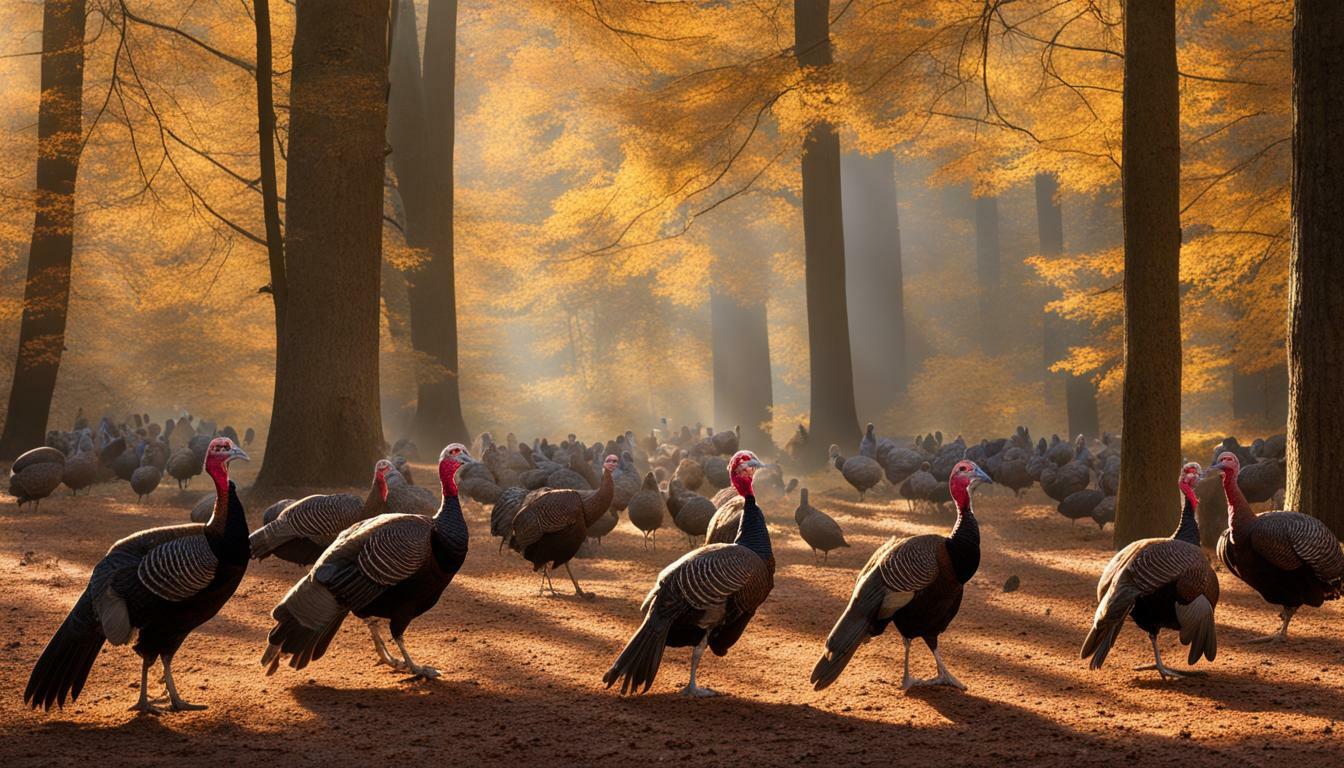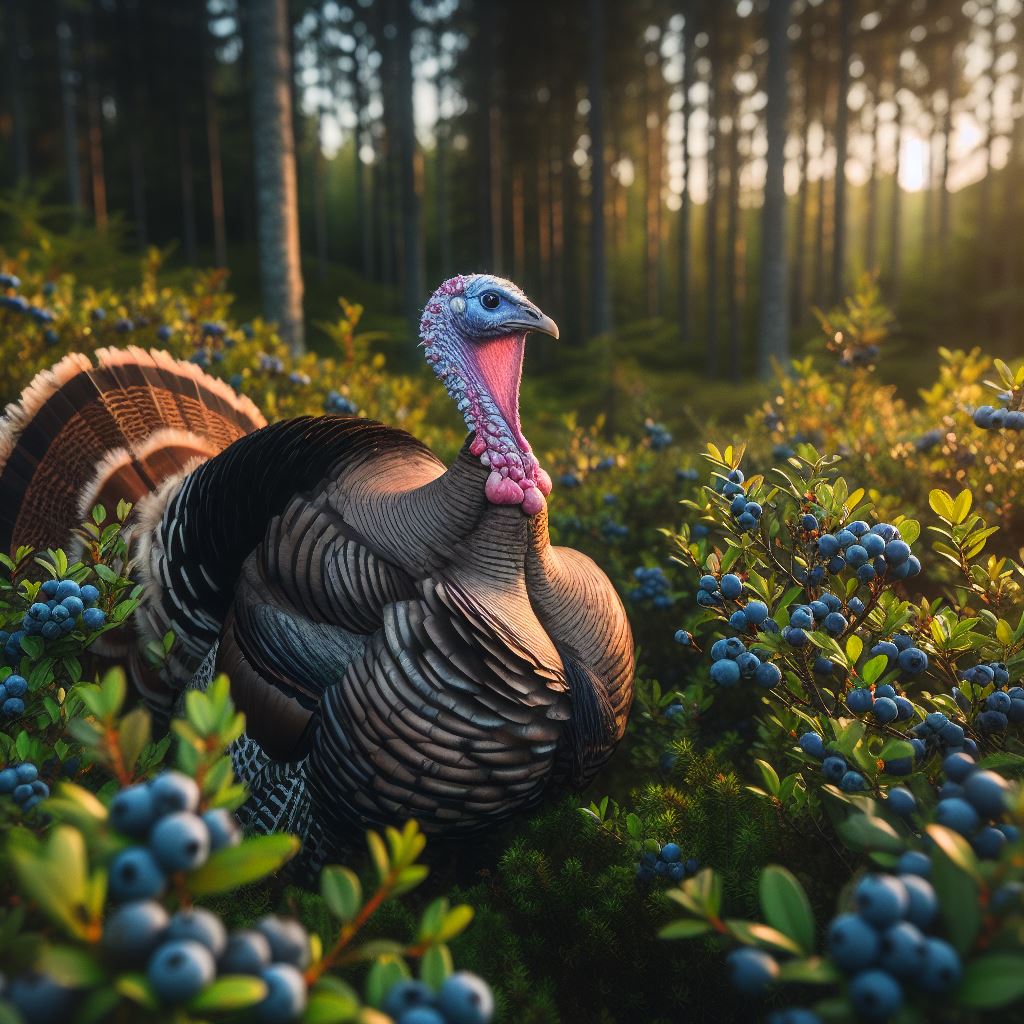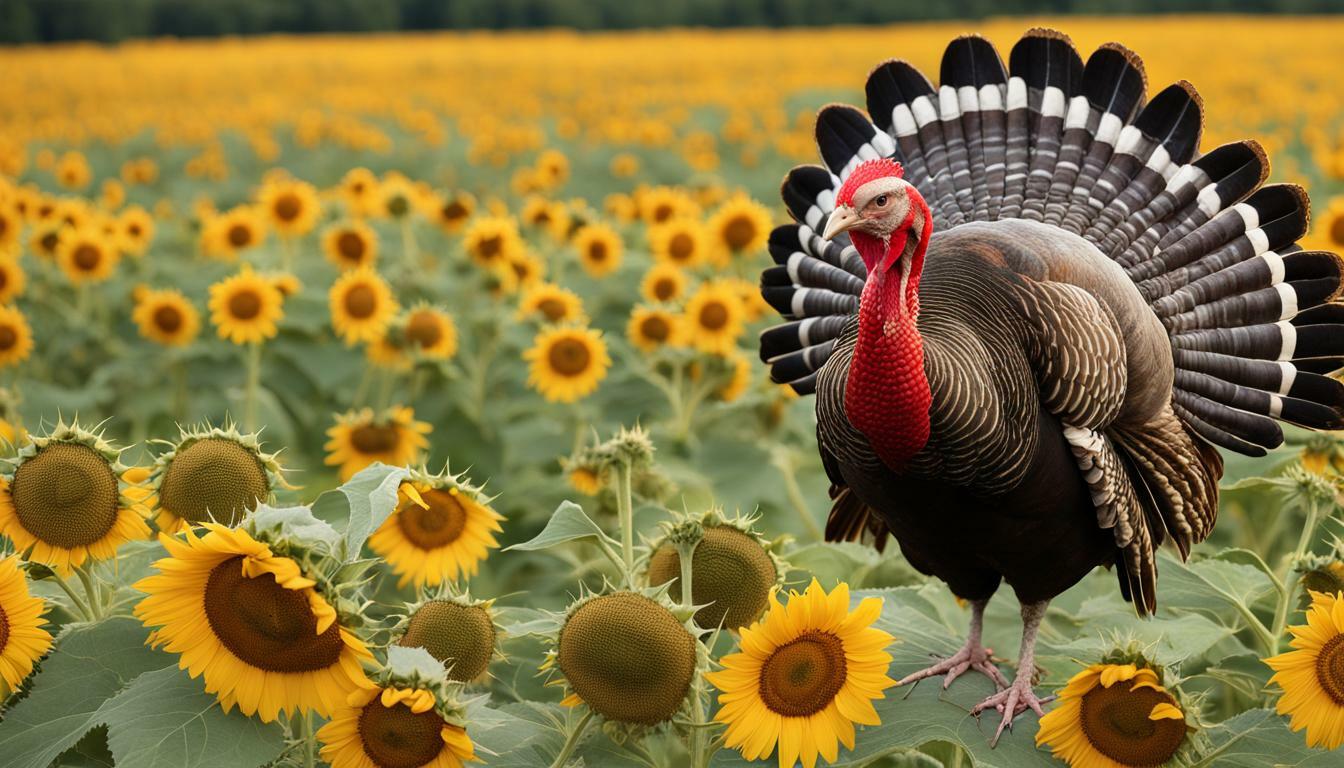Do Turkeys Eat Acorns? Uncover the Facts

Table of content:
Turkeys are large birds native to North America. They are known for their distinctive fan-shaped tails, bare heads, and the gobbling sounds made by males. Wild turkeys inhabit woods and forests, while domesticated turkeys are raised on farms for their meat.
Acorns are the nut-like fruits of oak trees. They provide a rich source of nutrients and calories for many wildlife species. But do turkeys eat acorns as part of their diet? Let’s take a closer look at the foraging behavior and nutrition needs of these unique birds.
What Do Wild Turkeys Eat?
Wild turkeys are omnivorous, meaning they eat both plant and animal matter. Their diet changes depending on the season and food availability. Here are some of the main components of a wild turkey’s diet:
- Seeds & Nuts – Acorns, beechnuts, pecans, and seeds from grasses, weeds, and agricultural crops. These provide carbohydrates and healthy fats.
- Fruits & Berries – Wild turkeys enjoy grapes, cherries, blueberries, blackberries, and more. The fruits provide sugars, vitamins, and water.
- Greens – Turkeys eat the tender leaves, stems, and shoots of many plants. Favorites include clover, grasses, sedges, and composites like dandelions. Greens supply protein and nutrients.
- Insects – Turkeys eat a wide variety of insects like beetles, crickets, ants, caterpillars, millipedes, and more. Insects offer concentrated protein.
- Grains – Corn, wheat, and oats left over from agricultural harvesting can provide an abundant food source, rich in carbohydrates and calories, for wild turkeys.
As omnivores, wild turkeys have a diverse diet that changes with the seasons. This flexibility allows them to take advantage of the most nutritious and abundant foods in their habitat.
The Importance of Acorns for Wild Turkeys
Acorns are a crucial component in a wild turkey’s diet, especially in the fall and winter. Acorns contain carbohydrates, fat, protein, and minerals like calcium, phosphorus, potassium, and magnesium.
Oak trees produce acorns during mast years when trees in a region synchronize to produce a bumper crop of nuts. In most falls, acorns can make up over 50% of a turkey’s diet. They provide vital calories to fatten up before winter.
Turkeys spend hours foraging on the forest floor under oak trees, gobbling up acorns. Their strong beaks crack open the acorn’s woody shell to access the nutmeat inside. Turkeys can eat over 200 acorns per day!
Acorns are so important that oak trees and turkeys likely coevolved together. The fatty acorns helped turkeys survive cold winters and fuel migration, while turkeys helped disperse oak seeds. This interdependency continues today.
Besides acorns, turkeys also opportunistically eat beechnuts, hickory nuts, pecans, pine seeds, and other nuts. But the widespread availability and abundance of acorns in eastern hardwood forests make them the #1 nut for wild turkeys.
When Do Turkeys Eat Acorns?
Acorns become a major part of a turkey’s diet in the fall months. Here is how a turkey’s acorn eating changes throughout the year:
- Spring – Turkeys eat a few acorns at this time as leftover nuts from fall are scarce. They instead focus on new greens, fruits, seeds, and protein-rich insects.
- Summer – With acorns unavailable, summer foods include fruits like grapes and berries, greens, seeds, grasses, and plentiful insects.
- Fall – Acorns start littering the ground beneath oak trees. Turkeys eagerly consume the abundant mast crop to fatten up before winter. Acorns can comprise over 50% of their diet.
- Winter – With snow cover, turkeys continue relying on leftover acorns through winter, along with available seeds, fruits, and greens. Acorns provide crucial energy and body fat.
So while turkeys eat some acorns year-round if available, they are most important in fall and winter when other foods are scarce. Taking advantage of seasonal mast crops is key to wild turkey survival.
How Do Turkeys Find Acorns?
Turkeys have adapted several key behaviors and traits to help them locate nutritious acorns:
- Sharp vision – A turkey’s eyes can detect small details and color variations from up to 100 yards away. This helps them spot acorns on the forest floor.
- Powerful scratching – Turkeys use their strong feet and long claws to rake away fallen leaves and debris to uncover hidden acorns.
- Keen memory – Turkeys remember productive acorn hotspots from year to year and return to them in the fall.
- Flock foraging – Groups of turkeys foraging together can cover more ground to find acorn jackpots. More eyes searching!
- Gobbling calls – Male turkeys seem to gobble more actively near oak trees. This may help attract females and communicate food availability.
- Following wildlife – Turkeys will follow squirrels, deer, and other animals to take advantage of mast crops they’ve located.
Through a combination of instincts, adaptations, intelligence, and social behavior, wild turkeys are excellent at exploiting seasonal acorn abundance. Their survival hinges on this important ability.
What Other Foods Do Turkeys Eat?
While acorns are a turkey’s favorite fall food, they eat a diverse array of other plant and animal materials:
Seeds & Nuts
- Beechnuts
- Hickory nuts
- Pecans
- Pine seeds
- Seeds of grasses, sedges, agricultural crops
Fruits & Berries
- Grapes
- Blueberries
- Blackberries
- Raspberries
- Cherries
- Virginia creeper berries
Greens
- Clover
- Alfalfa
- Grasses
- Sedges
- Ragweed
- Dandelions
- Lespedeza
Insects
- Grasshoppers
- Crickets
- Beetles
- Caterpillars
- Ants
- Centipedes
- Millipedes
Grains
- Corn
- Wheat
- Oats
This diverse diet provides a mix of carbohydrates, fat, protein, vitamins, minerals, and water needed to sustain wild turkeys throughout the year.
Do Turkeys Eat Tomatoes?
Tomatoes are members of the nightshade family and contain toxins. Some people wonder if turkeys can safely eat tomatoes.
The answer is yes, turkeys can and do enjoy eating ripe tomatoes on occasion. While tomatoes have low levels of toxins called glycoalkaloids, turkeys seem to tolerate them without issue.
A few juicy tomatoes from the garden make a nice supplement to a turkey’s normal diet. Just avoid feeding them exclusively tomatoes, as overconsumption may cause problems. Moderation is key.
Turkeys also eat other fruits and vegetables like squash, broccoli, apples, lettuce, peas, and more. So tomatoes in limited amounts are perfectly fine for these opportunistic, omnivorous birds.
Do Turkeys Eat Snakes?
As omnivores, turkeys will sometimes eat small vertebrates like snakes and lizards to obtain protein.
Mother turkeys have been observed eating small garter snakes. The snake’s scales, bones, and raw meat provide concentrated nutrition for hens and their growing poults.
Adult turkeys may also occasionally capture and consume small, non-venomous snakes like ringneck snakes, smooth green snakes, and worm snakes. Their powerful beaks can kill and process snakes effectively.
Eating snakes provides a turkey with protein, vitamins, minerals, and fat. However, snakes are only a minor component of a turkey’s overall diet. They favor more abundant options like acorns, fruits, seeds, insects, and greens most of the time.
Do Turkeys Eat Ticks?
Ticks are yet another protein source turkeys will opportunistically feed on. Their beaks allow them to easily pick ticks off vegetation and consume them.
Consuming ticks provides blood, fat, and protein. Some research even suggests that eating ticks may provide medicinal benefits for turkeys.
Ticks contain cardioprotective peptides that may support a turkey’s cardiovascular health. A turkey with fewer parasite loads may have enhanced immune function and survival outcomes.
So gobbling down ticks seems to offer nutritional and physiological benefits. While ticks make up a very minor portion of a turkey’s diet, snacking on them when available may boost their overall health.
Final Thoughts
In summary, acorns are a critically important fall food source for wild turkeys across North America. Their abundance and nutrient density help turkeys fatten up for winter and fuel migration.
But turkeys are adaptable omnivores and enjoy a diverse diet of seeds, nuts, fruits, greens, insects, grains, and even the occasional snack of snakes and ticks. Different foods support turkeys in each season.
The next time you see a turkey flock foraging in the woods, they are likely honing in on a bountiful acorn crop. Their ability to exploit seasonal foods like acorns is key to their wild success.
Welcome. I’m Adreena Shanum, the proud owner of this website, and I am incredibly passionate about animals, especially poultry. I founded adreenapets.com as a labor of love, stemming from my desire to share my knowledge and experiences with poultry enthusiasts worldwide.



